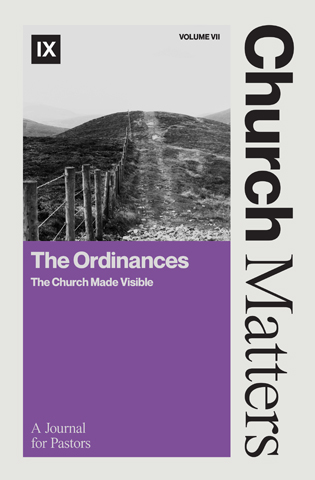What Is the Relationship Between Church Membership, Baptism, and the Lord’s Supper?
September 22, 2025

September 22, 2025
What is the relationship between church membership, baptism, and the Lord’s Supper?
In a sentence, these three matters relate like a thing, an entry sign of the thing, and an ongoing sign of the thing. Though it’s not a perfect analogy, we might think of citizenship (a thing), a birth certificate (an entry sign of the thing), and a passport (an ongoing sign of the thing). Or think of membership on a team, signing the contract, and wearing the jersey.
Let’s explore the citizenship analogy a moment longer. It helps us to see that all three things work together and should ordinarily stay together. You would not make someone a citizen without giving them a sign of citizenship. And you wouldn’t give them a sign of citizenship without making them a citizen.
For any of my more lawyerly and fastidious readers the analogy is no doubt imperfect. The topic of church membership needs to account for the dynamic between our membership in the invisible universal church versus our membership in a visible local church. That complicates things a little bit. Plus, various exceptions exist on both sides of the analogy. On one side, not every citizen receives a passport. On the other side, not every baptism occurs in a church (e.g. Ethiopian eunuch).
Fine, fine.
Still, the point remains; all three of these things ordinarily go together because they’re doing joint work. So our goal here is to grasp the rules before we consider exceptions to the rules. The way we’ll do that is by considering what membership, baptism, and the Supper are so that we can see how they work together.
First, what is church membership? It’s a covenant-like agreement between a church (all the members) and an individual Christian—between the many and the one. The many affirm the one’s profession of faith. They also agree to oversee his or her discipleship. And the one submits to the affirmation and oversight of the many.
I won’t take the time to unpack the argument here, but I believe Jesus lays out these terms in Matthew 16:19 and 18:15–20. The agreement he mentions in 18:19 is a binding or loosing agreement. It’s an agreement with judicial glue (see vv. 16 and 18). That’s why I would call membership a covenant or—for anyone afraid of that word—covenant-like (yet remember, if it quacks like a duck . . .).
The covenant-like agreement of membership is how a church stands before the citizens of earthly nations and publicly identifies someone as a citizen of the heavenly nation: “This one is one of ours!” The heavenly citizen, in turn, agrees to live out his or her heavenly citizenship in and through that embassy of heaven, or church.
How then do churches, these embassies of heaven, make such judicially binding declarations?
They start by baptizing a person “into the name of the Father, and of the Son, and of the Spirit” (Matt. 28:19). Baptism gives someone a nametag that reads, “I’m with Jesus.”
Typically, Baptists like me define baptism as an individual’s public profession of repentance towards God and faith in Jesus Christ. Yet baptism is both an individual and a corporate act. Two parties say something—the one and the many. The baptizee and the baptizer both speak. In addition to being an individual’s profession, it’s also a church’s affirmation of that profession.
Baptism, in other words, is how the church and the individual first sign and seal the covenant-like agreement of church membership.
“What shall we do,” the convicted crowd in Jerusalem asked Peter. “Repent and be baptized every one of you in the name of Jesus Christ for the forgiveness of your sins,” he answered (Acts 2:37b–38). Then we read: “So those who received his word were baptized, and there were added that day about three thousand souls” (v. 41). Added to what? The church in Jerusalem.
Christ intends for people to respond to the gospel message inwardly in repentance and outwardly in baptism. And ordinarily, he intends for us to be baptized into a church’s membership, as was the case in Jerusalem.
“But Acts 2 says nothing about membership!” someone argues. You’re missing the point. The point is that “they” knew who “they” were. It was those three thousand souls, as opposed to the rest of the people in Jerusalem. Those three thousand people—let’s name them: Fred, Barney, Alice, etc.—are “us.” Those are the members of the Jerusalem church.
How then do we recognize members in an ongoing fashion? What if some drift away and begin to live like the world?
This brings us to the Lord’s Supper. If baptism is the birth certificate, the Supper is the passport. If baptism is the signed contract, the Supper is the team jersey. If baptism is the front door into church membership, the Lord’s Supper is the ongoing family meal for church members.
This is why many historic Baptist statements of faith read, “Baptism is a prerequisite to the privileges of church membership and the Lord’s Supper.”
And the key here is, it’s a family meal. The Supper is not turbo-charged quiet time between you and Jesus that happens to occur in a room full of people. It’s not an eyes-closed affair. It’s an eyes-open, look-around-at-your-brothers-and-sisters affair. Listen to Paul: “Because there is one bread, we who are many are one body, for we all partake of the one bread” (1 Cor. 10:17; see also, 11:29, 33). Partaking of the one bread reveals, shows, or illumines who belongs to the one body.
The Supper is a church-revealer. It shines a spotlight on the church and says, “Here, oh world, is the church.” It makes the invisible church visible.
When it comes to establishing a brand-new church, therefore, taking the Supper—together with preaching the Word—is the most important thing we can do. That’s what my church—Cheverly Baptist—did to become a church. Before we took the Supper, we were a gathering of Christians. When we took the Supper—poof!—we were a church.
For any of you church planters out there who are still calling your church a “church plant”—guess what—if you’ve been taking the Supper, you’re a church. Congrats! You’re the real thing now.
Membership, baptism, and the Supper all work together to do the same thing: identify or designate the citizens of Christ’s kingdom. They are the practical, concrete, and localized way we affirm membership in Christ’s invisible and universal church.
Baptism and the Supper are the signs and seals of church membership. They’re signs in that they show it. They’re seals in that they formally or officially confirm it. They’re the mechanisms God has given to Christians for “signing the check” or “inking the deal” or “stamping the wax” for citizens of his kingdom.
All that means, all three ordinarily go together. Don’t make a person a member without baptizing them and giving them the Supper. And don’t give someone the Supper if you haven’t baptized them. And don’t baptize someone if you’re not going to make them a member. The three things are ordinarily a package deal because all three are doing the same thing: affirming someone’s citizenship in heaven and membership in Christ’s body.
Christianity, after all, is not an individualistic religion in which the most important thing about us is how we subjectively view ourselves. Rather, it’s the religion of a people in which the most important thing about us is what we actually are, and God uses both our internal self-impressions together with the external affirmations of other people to get a better read on what we actually are.
As such, God uses the affirming words of baptism and the Supper both to establish our membership in a church as well as provide assurance of salvation. Roman Catholics risk making it entirely objective through mechanistic participation in the sacraments (“He has gone to confession and received the Mass.”). Non-church-attending evangelicals risk making it entirely individual and subjective (“Do I think I’m trusting in Christ enough?”). Yet a right view of assurance is partially individual and subjective and partially corporate and objective. There’s a role for your conscience and a role for your church.
Church discipline, as such, occurs when a church can no longer affirm someone’s profession of faith because of unrepentant sin. Therefore, the church excludes someone from membership in the church and participation in the Table.
Last comment: why did I say all three “ordinarily” go together? Why not “always”?
With a missionary religion, in which evangelists and missionaries move out into new space, exceptions must occur. I take this from a few passages in the New Testament. No church existed in the desert to baptize the Ethiopian eunuch, just like no church existed in Thyatira when Paul baptized Lydia. Therefore, neither the eunuch nor Lydia were baptized by a church or into a church. Both were the firsts.
Yet those situations are extraordinary. The baptisms of the three thousand in Jerusalem, and presumably everyone after the eunuch and Lydia, are ordinary.
Practically, therefore, churches should very seldom baptize someone whom they’re not bringing into membership. Nor should they generally give the Supper to someone who has not been baptized. Exceptions exist, but they exist because those are the general rules intended by the New Testament.

Within the sacred gathering of the local church, Jesus offers the chance to see with your eyes and taste with your mouths what he has done for you all.
Go to Journal →